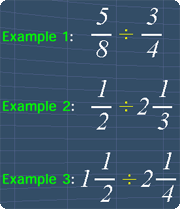Examples on How to Divide Fractions
Lesson Objective
In this lesson, we will see more examples on how to divide fractions. Also, we will see how to make use of common factor to simplify the division.
About This Lesson
After learning the basics on dividing fractions, let's see more examples. These examples will help us to have a better grasp on how to divide fractions.
Each of these examples will have the following types of fractions:
- 2 proper fractions
- 1 proper and 1 improper fraction
- 2 mixed fractions
The study tips and math video below will explain more.

Study Tips
Tip #1 - The basics
The previous lesson have explained the basics behind dividing fractions. Here is the summary:
-
Know how to find the reciprocal of a fraction
To find the reciprocal of a fraction, we just need to swap the numerator and denominator of that fraction. -
Steps to divide fractions
We can divide fractions by:- First, change the division sign to a multiplication sign
- Then, change the divisor to its reciprocal.
The math video will show some examples...
Math Video
Lesson Video
Sponsored Links

Please support us by downloading our Fraction Basics app and subscribe to get all 12 video lessons and All Access pass to 8 Zapzapmath Home apps with 180 math games from as low as US$1.67/month:
Apple App Store (iOS) |
Google Play (Android)
Math Video Transcript
00:00:03.120
In this lesson, we will see more examples on how to divide fractions.
00:00:08.210
Let's divide, 5/8 with 3/4. Here's how to divide fractions.
00:00:13.100
First, we change the division sign to multiplication sign.
00:00:18.010
We can do so, provided that we also swap the numerator and denominator of the divisor, 3/4, to get its reciprocal, 4/3.
00:00:28.170
By doing so, we now have 5/8 multiply by 4/3.
00:00:34.120
By multiplying these fractions, we have 5 multiply by 4, over, 8 multiply by 3.
00:00:42.100
Notice that, we can simplify this before multiplying by dividing 4 and 8 with the common factor, 4.
00:00:49.210
This gives, 1 and 2 respectively.
00:00:53.030
Since there is no more common factor, we can continue to multiply.
00:00:58.100
5 multiply by 1, gives 5. 2 multiply by 3, gives 6.
00:01:06.100
Finally, we have the fraction, 5/6.
00:01:12.080
Next example, let's divide 1/2, with 2 1/3.
00:01:18.110
Notice that, 2 1/3 is a mixed fraction.
00:01:22.240
We need to change it into an improper fraction before we can continue.
00:01:27.220
Multiply 3 with 2. This gives 6.
00:01:32.010
Now, 6 plus 1, gives 7. This 7 becomes the improper fraction's numerator.
00:01:39.140
Hence, we have the improper fraction, 7/3. Now, we can start dividing these fractions.
00:01:48.190
First, we change the division sign to multiplication sign.
00:01:53.150
We can do so, provided that we swap the numerator and denominator of the divisor, 7/3, to get its reciprocal, 3/7.
00:02:04.060
After doing so, we have, 1/2 multiply by 3/7.
00:02:10.150
Multiplying these fractions give, 1 multiply 3, over, 2 multiply 7.
00:02:17.230
Now, 1 multiply 3, gives 3.
00:02:22.040
2 multiply 7, gives 14.
00:02:26.030
So now, we have the fraction, 3/14.
00:02:33.010
Final example, let's divide 1 1/2, with 2 1/4. Here's how to divide fractions.
00:02:40.240
Since these are mixed fractions, we have to convert them into improper fractions before dividing.
00:02:48.060
Let's start with 1 1/2. 2 multiply with 1, gives 2.
00:02:56.050
Now, 2 plus 1, gives 3. This 3 becomes the improper fraction's numerator.
00:03:03.240
With this, we have the improper fraction, 3/2.
00:03:09.030
Similarly, let's convert 2 1/4 to an improper fraction. 4 multiply 2, gives 8.
00:03:19.070
8 plus 1, gives 9. This 9 becomes the improper fraction's numerator.
00:03:27.090
So now, we have the improper fraction, 9/4.
00:03:33.140
Alright, we can start dividing these fractions.
00:03:38.230
First, change the division sign to multiplication sign.
00:03:43.240
We can do so, provided that we swap the numerator and denominator of the divisor, 9/4, to get its reciprocal, 4/9.
00:03:54.130
Now, we have 3/2, multiply by 4/9.
00:04:00.040
By multiplying these fractions, we have 3 multiply 4, over, 2 multiply 9.
00:04:07.190
Here, notice that we can simplify this, by dividing 4 and 2 with the common factor, 2.
00:04:15.080
This gives 2 and 1 respectively.
00:04:19.130
Similarly, we can divide 3 and 9 with the common factor, 3.
00:04:25.160
This gives 1 and 3 respectively.
00:04:30.030
Since there are no more common factors, let's continue the multiplication.
00:04:35.230
Multiply 1 with 2, gives 2. Multiply 1 with 3, gives 3.
00:04:43.180
Finally, we have the fraction, 2/3.
00:04:49.070
That is all for this lesson. Try out the practice questions to test your understanding.
--End of How to Divide Fractions Transcript--
Practice Questions & More
Multiple Choice Questions (MCQ)
Now, let's try some MCQ questions to understand this lesson better.
You can start by going through the series of questions on how to divide fractions or pick your choice of question below.
- Question 1 on dividing a proper fraction with a mixed fraction
Site-Search and Q&A Library
Please feel free to visit the Q&A Library. You can read the Q&As listed in any of the available categories such as Algebra, Graphs, Exponents and more. Also, you can submit math question, share or give comments there.


